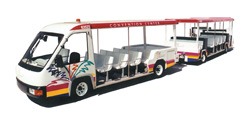Battery-Electric Vehicles
Battery-electric vehicles are a zero-emission transportation solution (ZETS) that relies on stored battery energy for propulsion. Battery-electric vehicles do not use combustion engines or store any onboard fuel, so they produce zero emissions. Vehicles are typically recharged at least once a day with a battery charger plugged into a standard electrical outlet. The most famous battery-electric vehicle was probably the General Motors EV-1, a sleek, futuristic car that was leased to a few hundred customers in the late 1990s, before the model was discontinued by GM. The auto industry has argued that battery-electric cars are not practical, due to limited operating range, battery replacement costs, and customer reluctance to "plug in" vehicles for battery recharging every night.
Battery-electric vehicles have found niche applications where power and range requirements are extremely limited, and where frequent recharging is possible, such as in golf carts and forklifts. In larger vehicles, battery-electric propulsion has been used in a few hundred trams (e.g., "zoo shuttles") and small, locally-operated buses and delivery trucks with modest power requirements.
 |
ISE-Trams International electric tram |
The vast majority of these vehicles have used conventional lead-acid batteries, a major factor in the limitation of battery-electric vehicle applications. Lead-acid batteries are heavy and, when used in high-voltage automotive applications, prone to early failures. However, long-awaited advances in battery technology will almost certainly expand the range of practical battery-electric vehicle applications over the next few years.
TransPower offers expertise and access to the leading suppliers of battery-electric transportation solutions. We believe there is particular promise in the emergence of lithium battery technology. Small lithium batteries are currently used in cell phones and other small devices. Larger lithium batteries – currently being developed by many companies around the world – will enable reductions in the weight of battery-electric vehicles, along with extended operating range and battery life. TransPower believes that lithium battery technology will "leapfrog" other advanced battery chemistries, such as nickel metal hydride and nickel cadmium, and enable a revolution in battery-electric vehicle propulsion over the next two decades.
In addition to providing battery-related expertise and products, TransPower can assist client-partners in selecting or designing the right electric drive system to take advantage of advances in battery technology. Electric motors and control systems are equally vital to the safe, reliable operation of battery-electric vehicles, and TransPower’s Preferred Supplier Network includes the leading suppliers of electric drive motors and related products for vehicle applications.
TransPower is ready to help you decide if battery-electric technology has reached the point where it can be used cost-effectively in your vehicle fleet, and can assist you in selecting the best battery-electric propulsion system, based on the size, duty cycle, and other operating requirements of your vehicles. |